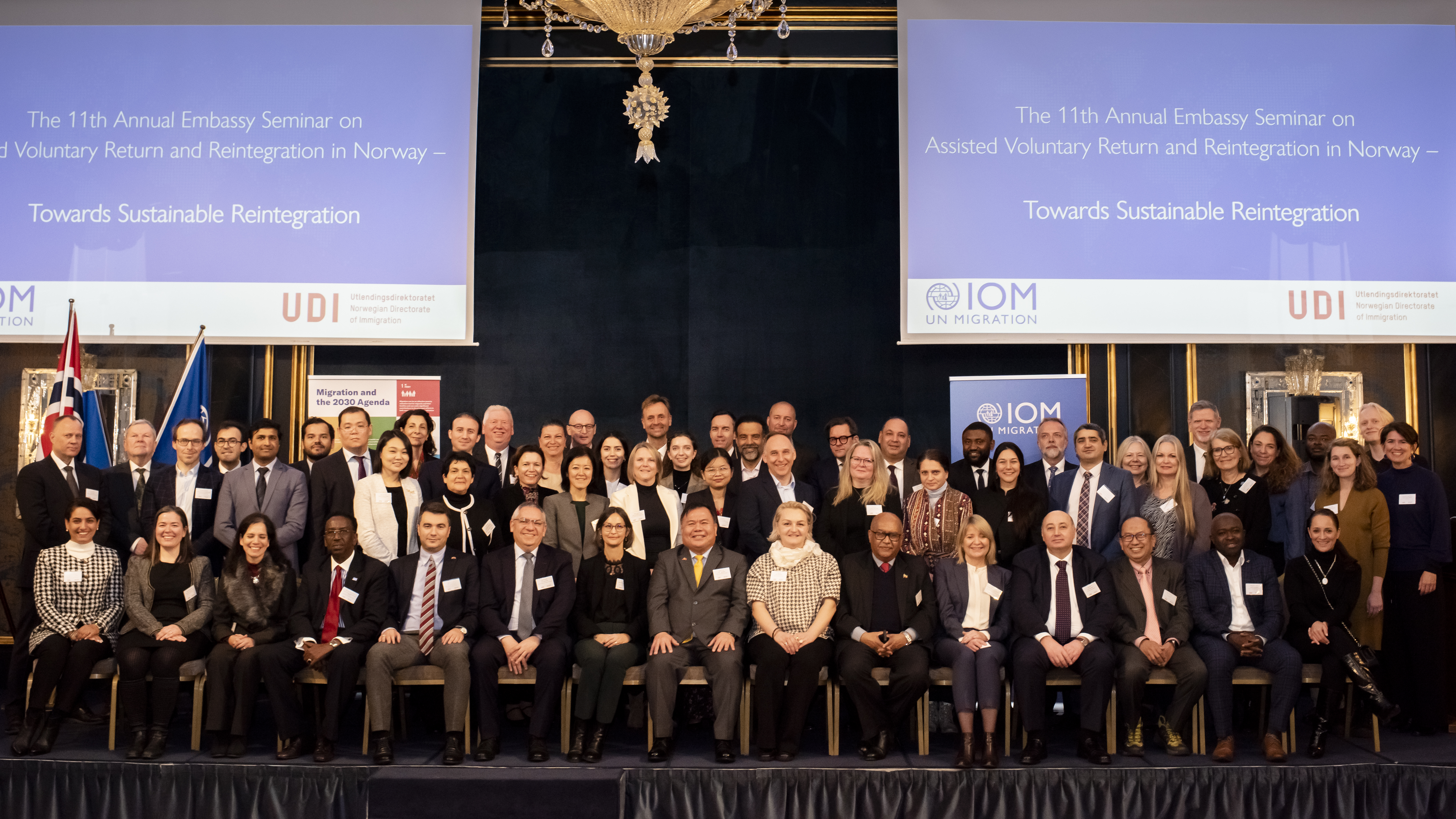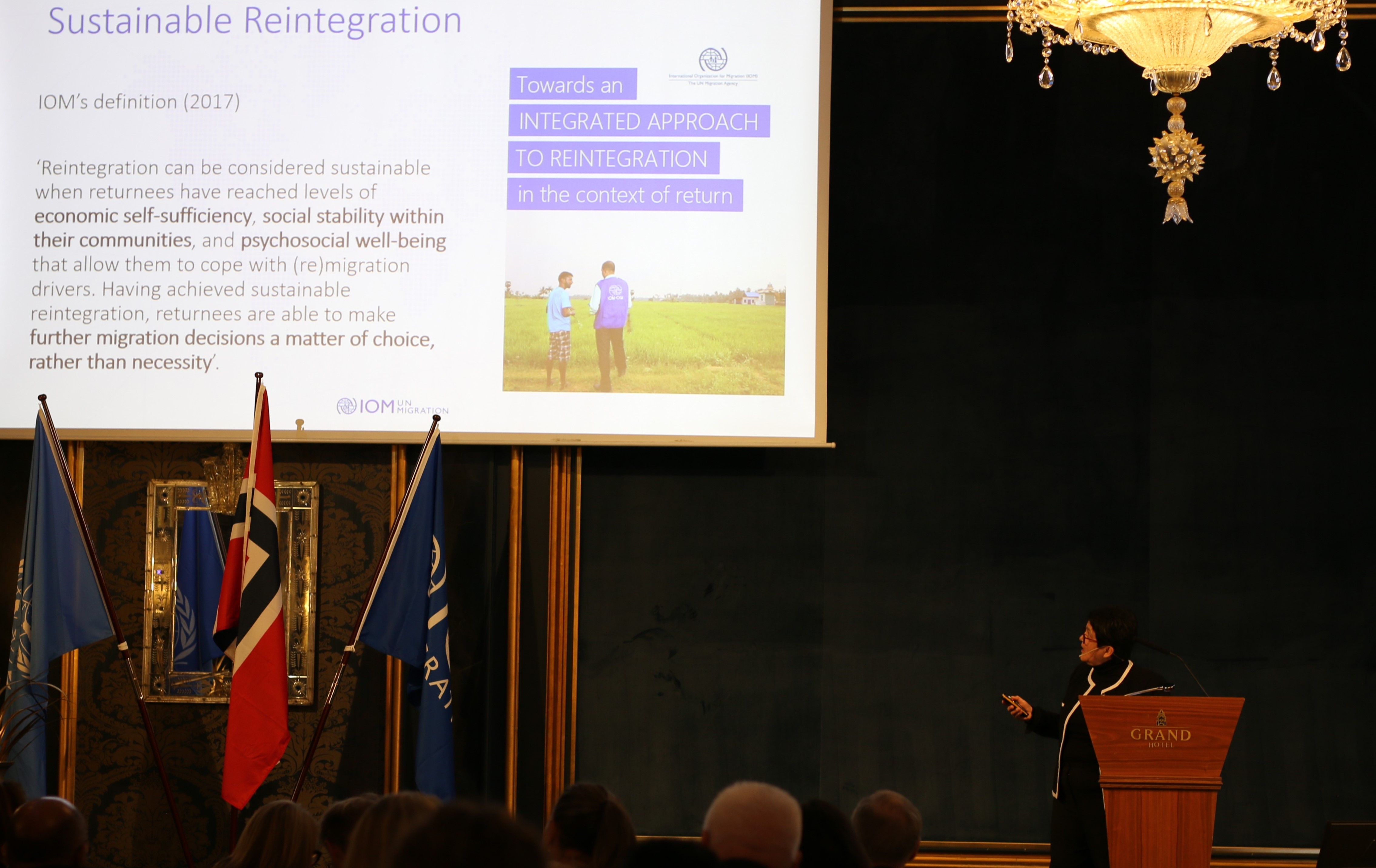-
Who we are
WHO WE AREThe International Organization for Migration (IOM) is part of the United Nations System as the leading inter-governmental organization promoting since 1951 humane and orderly migration for the benefit of all, with 175 member states and a presence in over 100 countries. IOM has presence in Norway since 2002.
About
About
IOM Global
IOM Global
-
Our Work
Our WorkAs the leading inter-governmental organization promoting since 1951 humane and orderly migration, IOM plays a key role to support the achievement of the 2030 Agenda through different areas of intervention that connect both humanitarian assistance and sustainable development.
Cross-cutting (Global)
Cross-cutting (Global)
- Data and Resources
- Take Action
- 2030 Agenda
Advancing Sustainable Reintegration: Highlights from the 11th Annual Embassy Seminar
The International Organization for Migration (IOM) in collaboration with the Norwegian Directorate of Immigration (UDI) held the 11th Annual Embassy Seminar on the 31 October 2023 in Oslo, Norway. The Seminar brought together a total of 79 participants representing 32 embassies and eight organizations to share their perspectives on Assisted Voluntary Return and Reintegration (AVRR), which is implemented in Norway through the Voluntary Assisted Return Programme (VARP). With the theme of “Towards, Sustainable Reintegration,” this year’s seminar provided a platform to discuss collaboration between IOM, UDI, embassies, and key stakeholders, to aid those wishing to return to their countries of origin and facilitate their sustainable reintegration.

Addressing Migration Challenges
UDI Director Frode Forfang welcomed the participants to the one-day seminar and set the tone by acknowledging the substantial migration challenges faced by the European Union, particularly intensified by the conflict in Ukraine. Mr. Forfang highlighted Norway's ongoing support for Ukrainian refugees, hosting over 60,000 Ukrainians as of 31 October 2023, with around 1,000 arrivals per week. He emphasized that Norway also supports the global resettlement of 2,000 quota refugees in 2023, in collaboration with UNHCR. Mr. Forfang stressed the importance of distinguishing between legitimate and unfounded asylum claims, underscoring mutual responsibility to communicate criteria and opportunities for individuals coming to Norway.
Ola Henrikson, Regional Director of IOM, expressed gratitude to the distinguished guests and acknowledged the leadership of the Government of Norway in implementing VARP, emphasizing the role of UDI and the crucial support provided by embassies in understanding the unique needs of returning migrants. He reiterated IOM's commitment to empower migrants, enabling them to exercise their agency and emphasized that returns should be voluntary wherever possible, while recognizing the sovereign right of States to forcibly return migrants in compliance with international human rights law. Mr. Henrikson highlighted the benefits of voluntary returns, including informed decision-making, consent, returnee ownership, reduced stigma, and enhanced opportunities for successful reintegration and human development.

Collaborative Efforts for Sustainable Reintegration
The opening statements by UDI and IOM were followed by presentations from Vibeke Jørgensen, Head of Return Unit, UDI, who gave an overview of UDI’s plans and priorities moving forward, emphasizing that collaboration among foreign missions, IOM, Frontex, and embassies can further enhance efforts around assisted return.
Agueda Marin, IOM Senior RTS Protection, Return and Reintegration, provided insight on IOM’s approach to AVRR and the pre-departure activities that contribute to sustainable reintegration, also highlighting the increase in vulnerable migrants and the need for not just economic but also social and psychosocial support to empower migrants.
Robert Schuetz, Seconded National Expert and Operational Officer, Frontex continued the seminar by outlining Frontex’s role in supporting member states in reintegration counselling, stating that each reintegration plan is agreed upon with Member States. To date, Frontex has supported over 5,700 returning migrants, of which 71.57% were voluntary returns.
Finally, Erlend Paasche, Senior Researcher of the Norwegian Institute for Social Research, delivered a thought-provoking presentation on definitional questions surrounding sustainable reintegration. Mr. Paasche asserted that assisted return legitimizes forced return, making ownership of the origin state imperative to facilitation of sustainable reintegration.

Panel Discussion: Sustainable Reintegration
After the presentations, a panel discussion was moderated by Knut Holm, Return Coordinator for UDI’s International Unit, featuring Mehretab Mulugeta Haile, the Ethiopian Ambassador to Sweden, Saadia Altaf Qazi, Ambassador of Pakistan to Norway, Agueda Marin of IOM, Robert Schuetz of Frontex, Siw Lexau, Deputy Director General, Ministry of Justice and Public Security (MoJ), and Erlend Paasche, Norwegian Institute for Social Research. The panellists shared knowledge and perspectives on sustainable reintegration based on their respective extensive experiences and expertise.
MoJ Deputy Director General Lexau concluded the seminar by reiterating the significance of dialogue and cooperation between host and return states and acknowledged the role of embassies to facilitate solutions. Recognizing IOM as a crucial partner, she stressed the preference for voluntary return, while also acknowledging that there are migrants who are escorted by the national police, in cooperation with embassies and governments in the countries of origin.
The 11th Annual Embassy Seminar provided a comprehensive platform for stakeholders to share insights, challenges, and strategies for achieving sustainable reintegration. The event emphasized the significance of dialogue, collaboration, and policies to support voluntary returns and reintegration. The active engagement of embassies, government officials, and organizations in the seminar underlined the shared commitment to addressing migration challenges and promoting positive outcomes for returning migrants.